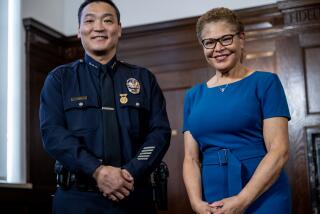LAPD Chief Moore under fire over looting remarks, police treatment of protesters

In more than a week of civil unrest since the killing of George Floyd, Los Angeles Police Chief Michel Moore has been at the helm of a massive police response, which has included the controversial firing of foam bullets and arresting of peaceful protesters.
Some of those tactics and a remark he made in an empty room at City Hall on Monday, with reporters watching remotely because of COVID-19, have left him scrambling to preserve all he has worked for as a chief staking his legacy on repairing frayed relationships with black and Latino residents.
Minutes after saying that looters were as responsible for Floyd’s death as were the Minneapolis police officers who held down his neck with a knee or watched it happen, Moore walked back the words.
But no matter how much he repeated and rephrased the apology, the damage was done.
The following day, he sat silently at a Police Commission meeting for nine hours as citizen after citizen — several hundred in all — demanded his resignation. While Mayor Eric Garcetti and other officials have expressed support for Moore, a petition calling for him to be fired because of the remark has more than 42,000 signatures.

The comment and the uneven response to the unfolding unrest have put Moore on the defensive.
The department will be preparing an “extensive after-action report” to assess its performance during the protests and is investigating disturbing images of aggressive police tactics caught on video, he said.
As the situation spiraled out of control in the Fairfax District last weekend, Moore ordered officers to stop striking protesters with batons. On Tuesday, Garcetti said he has instructed the LAPD to minimize the use of foam bullets and batons, and “if we can, to not use them at all.”
Moore has tried to show another side of the LAPD, sympathizing with the public outcry over Floyd’s killing, acknowledging the racial inequities in American society and sometimes kneeling in front of protesters to show his willingness to listen.
“We see the hurt. We know and recognize the pain, the anguish,” Moore said in an interview with The Times. “We’re disgusted, and we share so many of the same emotions with regard to this latest episode that George Floyd represents and with regard to issues of black people and all communities of color and their standing in America and the inequities that exist today and the history that has made that existence seem forever.”
But his Monday comments, while focused on looters, were perceived by many as at odds with that ethos.
“We didn’t have protests last night. We had criminal acts,” Moore said. “We didn’t have people mourning the death of this man, George Floyd. We had people capitalizing. His death is on their hands as much as it is those officers.”
Moore said he spoke off the cuff, on little sleep after a long day, and “entirely made the wrong connection” in searching for an analogy.
He meant to say that the looters were distracting from the focus on racism in policing sparked by Floyd’s death and the nationwide protests that followed, he said.
“I regret that that misstatement and that mistake has taken as much time away from focusing on the true issues and true concerns of police reform, of societal reform, of how we make our society fair to all, and particularly addressing the injustices involving our black communities,” he said.
Moore is not known for being a stylish orator. His statements often devolve into bureaucratese. But he chooses his words carefully and is not prone to gaffes. That made the remark all the more striking.
Some community leaders say it reminded them of something an LAPD leader would say in the 1980s and early 1990s, at a time of widespread police abuse targeting minorities. Moore was a young officer back then and rose through the ranks of a department that spent two decades enacting wrenching reforms, trying to repair relationships with communities of color and working to build a more diverse police force.
“Was he in a candid moment actually telling the truth? If so, that candid moment told me one thing,” said longtime civil rights leader Earl Ofari Hutchinson. “Has this department, with its promises of reform, is there a danger of showing the old face of the LAPD? Is there a danger of slipping back into that?”
Hutchinson said he is not calling for the chief to step down, despite his grave concern over the remark. But he said Moore has work to do to build back his credibility.
“What the chief doesn’t want is to be the second coming of Daryl Gates,” Hutchinson added, referring to the former police chief known for his hard-charging crime-fighting tactics, including Operation Hammer, with officers attacking apartment buildings with battering rams and rounding up thousands of people in South L.A. in 1988.

Many protesters and Black Lives Matter leaders say it’s time for him to go.
Paula Minor, an organizer for Black Lives Matter, said Moore’s remark shows that his mindset is closer to Gates’ than to a reformer who will work with activists to change policing in the city.
“He may sound better, look better and use better words,” Minor said. “But the mentality, the attitude is the same. It’s a ‘them,’ it’s a ‘those people’ philosophy. That’s why our policing system truly has bias against black people.”
Moore appears to have survived the crisis, for now. Garcetti has rallied behind him, as have City Council members.
Garcetti said he has known Moore for decades, and the chief could not possibly have meant that looters are “the equivalent of murderers.”
“If I believed for a moment that the chief believed that in his heart, he would no longer be the chief,” Garcetti said.
But Moore’s misstep highlights the fragility of the progress the LAPD has made since the 1992 riots, which still haunt him and other veteran officers, and the enormity of the task ahead, once the protesters go home and the shattered windows of looted businesses are replaced.
He must build trust in the Police Department in a city where thousands of protesters experienced firsthand officers making arrests for curfew violations and firing foam bullets into crowds.
The Times reported Thursday on a growing number of videos showing disturbing behavior by officers against protesters. While he contended that violent individuals have “intermixed” with peaceful protesters at some scenes, Moore conceded that footage of officers swinging at people with batons and firing foam bullets has given him pause and will be investigated.
On Friday, U.S. Rep. Ted Lieu (D-Torrance) wrote a letter to the civilian Police Commission demanding an investigation into how the department responded to peaceful demonstrations in the Fairfax District last Saturday.
“Folks who loot or commit arson or assault police officers are committing crimes, and that cannot be condoned or tolerated. At the same time, you can’t attribute what some folks did on one day and then deal with peaceful protesters on a different day and hit them with batons,” Lieu said Friday.
In addition to the investigations, Moore must remake the department following the outline described by Garcetti and the civilian Police Commission on Wednesday, including increased training, more emphasis on community policing, greater scrutiny of officers’ use of force and $100 million to $150 million in cuts out of an overall $1.86-billion budget.
Informing his actions will be the demands, grievances and raw emotions of the protesters he spoke with on the streets, as well as the needs of his 10,000 police officers, some of whom were upset by the vitriol directed at them during the unrest and some of whom were injured in the chaos.
Since becoming chief in June 2018 after more than three decades with the LAPD, Moore has attended countless community events — violence prevention groups, life skills meetings for formerly incarcerated people, Sunday church services, black university alumni gatherings.
But those efforts at relationship-building and mutual understanding can be undone by police brutality caught on a video from halfway across the country — or by a leader’s jarring remark that he quickly retracted.
The LAPD’s reputation as an agency reformed by a federal consent decree has suffered during Moore’s tenure after Times reporting revealed that officers disproportionately stopped and searched black drivers and that
some members of the elite Metropolitan Division falsely portrayed people as gang members or associates.
In response, Moore has drastically reduced the department’s reliance on vehicle stops and is investigating the Metro officers who allegedly falsified records. Among the reforms announced by Garcetti earlier this week is a moratorium on entries into the CalGang database.
“We work hard for trust,” Police Commissioner Steve Soboroff said. “Look at it as a bank account, where deposits can be only made a dollar at a time, by doing the right things, but withdrawals are made from all over the country at a million dollars each.”
Soboroff said he views Moore in the context of his long career and his value to law enforcement. Contrary to his one unfortunate statement, Moore is a firm believer in community policing and deescalation techniques that reduce the use of force, Soboroff said.
Moore’s predecessor, Charlie Beck, was met at every weekly Police Commission meeting by Black Lives Matter activists calling for his firing.
Moore had escaped that treatment — until his remark about the looters.
Now, he has become the focus of ire. And it remains unclear how much the historic protests will change the political dynamics at City Hall. Garcetti has proposed cuts at the department, though only a fraction of what Black Lives Matter wanted.
Still, the protests are likely to significantly expand the clout of Black Lives Matter and other police reform groups.
Moore continues to have support from some black community leaders the department has cultivated in recent years.
As unrest unfolded around the city last weekend, Perry Crouch heard that young people were planning to loot a Smart & Final store near the Jordan Downs housing development in Watts.
Crouch, a longtime Watts resident and member of the Watts Gang Task Force, was determined to keep looting out of his neighborhood. He worked with the captain of Southeast station to coordinate the response and stood with police officers to protect the store.
It was a far cry from the days when some LAPD leaders were openly racist, Crouch said. Things started to change when Bill Bratton became chief in 2002 and assigned a new generation of police captains to work with community leaders on common goals, he said.
But despite the progress, the LAPD has much more work to do with young black residents who feel stereotyped and undervalued, Crouch said.
“Young people just want them to listen, to stop judging me as a gang member because I wear baggy pants, to stop judging me as a criminal, as a person not worthy of respect,” he said. “Talk to me. See what’s on my mind.”
Times staff writers Emily Alpert Reyes and David Zahniser contributed to this report.
More to Read
Start your day right
Sign up for Essential California for news, features and recommendations from the L.A. Times and beyond in your inbox six days a week.
You may occasionally receive promotional content from the Los Angeles Times.







